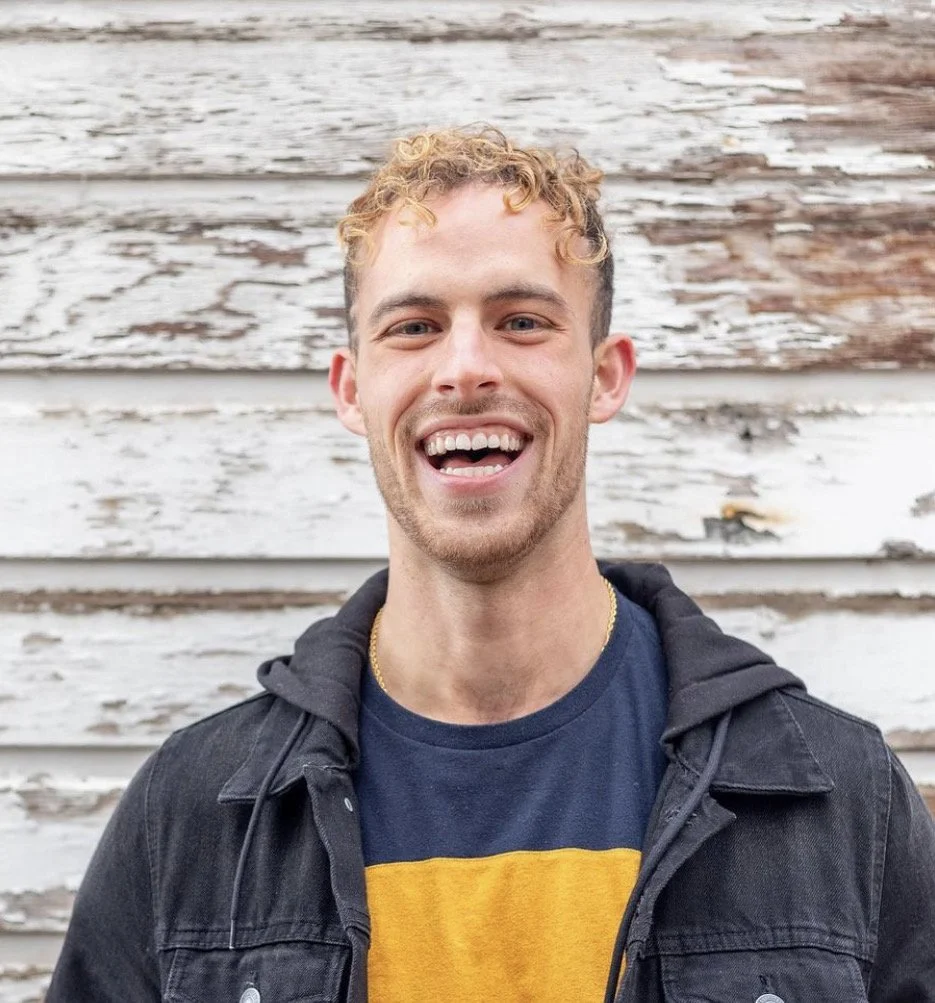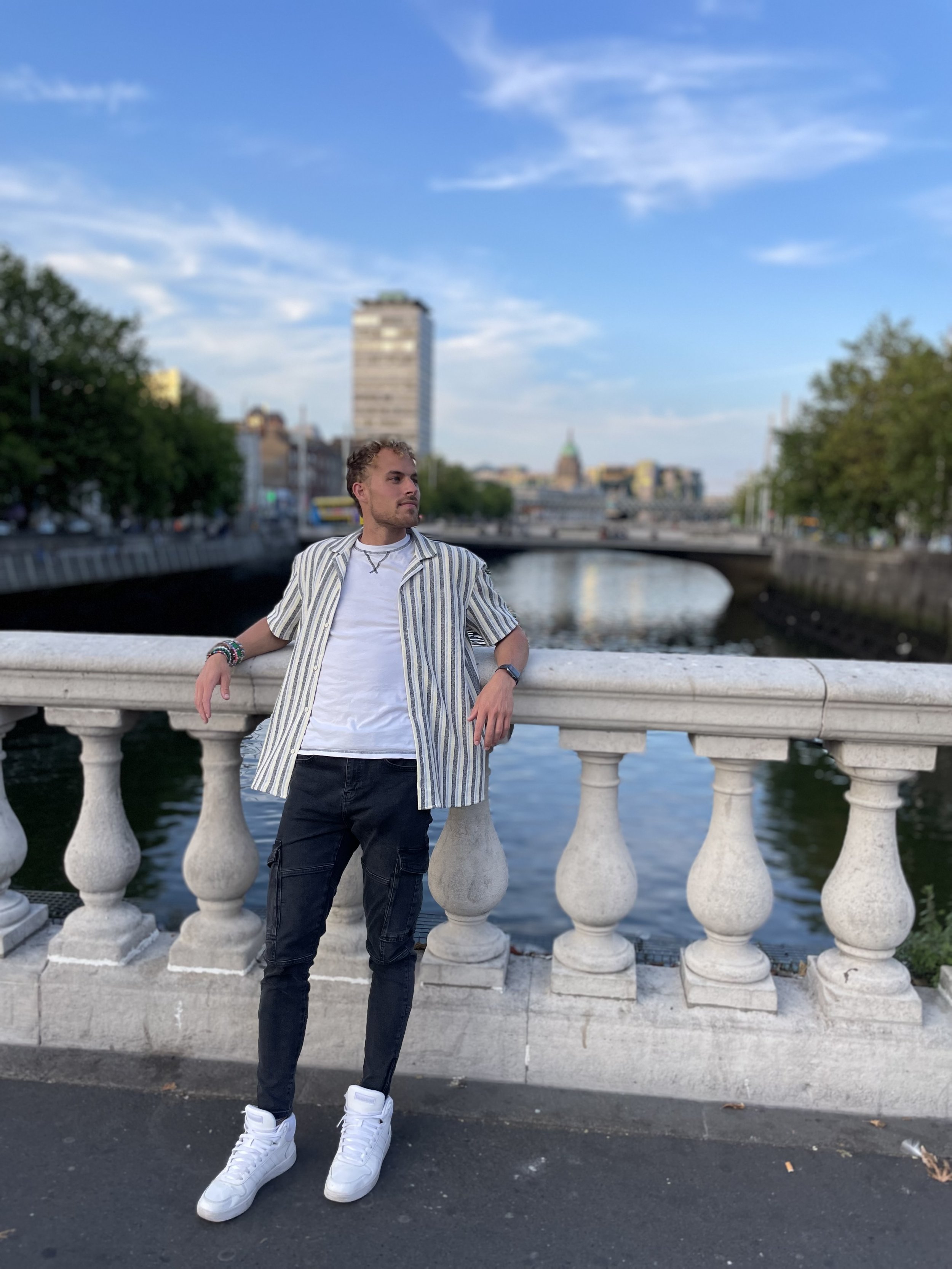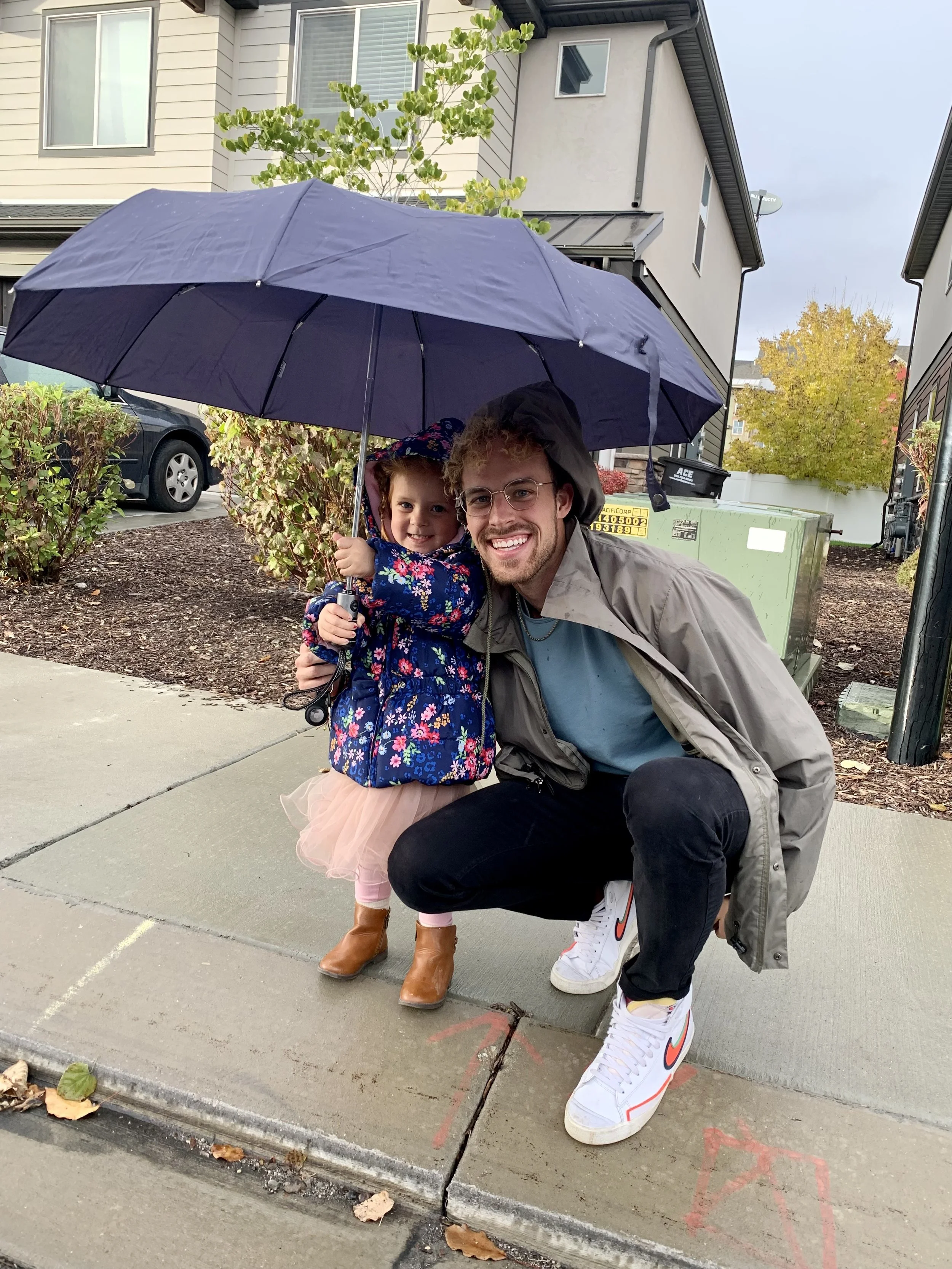Michael Niemann, 26, had just left a blissful week at Lake Powell, enjoying time with friends off the grid, when his phone blew up. Now that he had reception again, he quickly picked up on the fact he had missed something big. It was August of 2021, and messages of “Are you okay?” and “Here for you” poured in. He wondered what had happened. He quickly pieced together that a talk by an apostle had been given to BYU administration and faculty that was uncharacteristically hurtful as Elder Holland had encouraged figurative “musket fire” to be taken up against those who advocated for their LGBTQ loved ones. The talk had hit hard for many on campus and beyond, and this was a painful time for many LGBTQ individuals and their families trying to decipher whether they could still make the church work.
On BYU campus, an impromptu path of sidewalk-chalked, rainbow hued messages of love and support had been created by a multitude of students nightly. As Michael caught up on all he’d missed, one storyline, in particular, shocked him. A BYU student had arrived one night at the rainbow row and squirted a water bottle on the messages of love and hurled offensive accusations including the f-slur toward the LGBTQ population. It had been caught on camera and gone viral, even making headline news. Michael’s heart dropped when he saw that the young man on camera was his neighbor, and in fact, his assigned minister in his LDS student ward.
Michael is known among his friends and family for his bright smile, his effervescent energy, his kind, upbeat demeanor. But this hurt. While everything in him wanted to retreat, he still felt a pull that he needed to check on this neighbor. And he did. He called him up and offered to bring over a Brick Oven pizza. The neighbor acquiesced. Michael entered a space that felt dark and lonely, and found his neighbor in a very dark and lonely headspace. He had understandably been ostracized by many, and was in hiding and facing expulsion from the university for his behavior. While Michael definitely understood the anger many were feeling against the young man, he says a different impression overpowered him--the image of Christ on the cross offering up compassionate words for the accused who hung on either side of Him: “Father, forgive them for they know not what they do.”
In that profound moment, Michael felt an immense love enter his heart, as he saw his neighbor as a fellow hurting, broken soul. Michael says this love he felt was limitless, and fueled from an outside, spiritual source. “There was no part of me that questioned if I was loving too much, by not condemning his behavior.” He sensed the student had not had many personal interactions with gay people, and indeed, the neighbor confirmed that he thought he had only been doing what was right, and what he had been taught. When Michael sensed the dark frame of mind of his neighbor as he awaited Friday’s hearing to determine whether he’d be expelled from the university, Michael left with the impression to continue to check on him that week. He did, every day. When Friday came, the student found out he was suspended, and prepared to leave campus. As he did, Michael went over for one final face-to-face, during which he finally asked his neighbor a question: if he had known that he (Michael) was gay. The neighbor seemed surprised and said no, he hadn’t. He then apologized for what he’d done, for everything.
The two still remain in touch today.
Michael tries to live by the Marianne Williamson quote, “The way of the miracle-worker is to see all human behavior as one of two things: either love, or a call for love.” Obviously, Michael is exceptionally capable of realizing the depths and breadth of that statement. And he has taken his gifts to the public, as one of the original creators of Provo’s Treehouse Talks speaking forum, which is now spreading to other college campuses. Along with his close friends Hollis and Mio, who he credits for being the best of friends and instrumentally supportive to him in every way, the trio started the Treehouse events to lend a microphone to young adults to share the stories and experiences that make them uniquely them. The 9pm bi-weekly gatherings are popular, bustling with diverse crowds who equally embrace diversity and the bonds that come through sharing vulnerable experiences.
Michael, a graduate of BYU’s Masters in Information Systems program who now works for a Dublin, Ireland-based software company, is fascinated by people, and has always enjoyed a wide circle of friends. It took him some time to understand his sexuality as in high school, he mostly enjoyed hanging out with large groups of friends. He dated a girl for seven months as a freshman and was much more worried about whether he was “breaking the rules” dating at the age of 14 than the fact that he wasn’t feeling a strong physical attraction to a girl. He’s always preferred the company of male friends, which never crossed any lines into romantic connections, but as his preference for hanging out with guys continued into his mission, he started to wonder about his attractions. He says he’d hear people joke that with your mission goggles on, your high standards of attraction decrease until the point that you might even find your companion attractive. But for him, he started to wonder, as around this time, as he realized he didn’t find girls appealing in that way. He credits an extremely astute, compassionate mission president as being the first person he came out to when he asked him, “President, what would you say to someone who’s gay?” The President responded, “I’d let them know I still love them and I know God loves them… Elder Niemann, is this you?” Michael says his president offered him meetings with a mission psychologist but never asked insensitive questions or offered any forms of disrespect. This is something Michael really appreciates, and says lent to him not feeling anger or hatred toward people in the church.
After Michael returned home, he tried to date girls, but there was no romantic desire. As three relationships lasted long enough where there should have been one, he ultimately felt it wasn’t fair for them to be partnered with someone who had to fake attraction. These realizations forced Michael to ask tougher questions about how who he was fit into God’s plan, and whether or not God knew and loved him for who he was. He became very deliberate about prayer and scripture reading. Then when Covid hit and in-person church stopped, Michael says it felt like a breath of fresh air in which he could step back and not have to try so hard. That period of reevaluation became the “darkest period of (his) life” as he questioned whether his life had a purpose and was worth continuing. He realized he needed to be more authentic with his struggles, which brought a lot of healing. At this time, he turned to his friends Hollis and Mio and threw himself into the Treehouse Talk endeavor. By connecting deeply with others, he realized his life would be best lived if he connected authentically with himself.
For Michael, attraction is more of a cerebral thing. When someone asks who is his celebrity crush or who he finds “hot,” he responds, “Let me meet them first, then I’ll know more.”
Michael now dates men, and considers himself a spiritual person who wholly believes in compassion and trying to be Christlike, but who has a lot of questions about the church. On October 11 of 2021, he decided to share his thoughts with friends who had been asking, and his own words best convey the conflict so many in this space feel:
“Today is National Coming Out Day and has been the cause of reflection on my journey. Nothing has challenged my self-worth more than being a gay member of the church.
When I first began the journey of coming out to myself as gay, it started as a personal investigation on my attractions and what the church said about it. Being a member of the church added additional layers of complexity to coming out as gay.
I would read things emphasizing that homosexuality was a sin and comparable to murder. It was a perversion of agency, unnatural and disgusting. But it was also curable. As an impressionable 19-year-old, I absorbed all of this.
With the understanding that I could ‘control’ or change my ‘perversions,’ I made every effort to fix my sexuality. When this did not work, I began to detest myself for my wickedness and inability to overcome my sin. I woke up each morning disgusted with myself. I hated myself more than I have ever hated another person. Suicide became more appealing than being gay and alive. I desperately wanted to escape my sin and what it meant to be gay. I felt very alone during this time and despised my friends who were enjoying dating.
During my journey of coming out, the church continued to convey mixed messages. I was told that I belonged but not to label myself as gay. I was told that I was loved and that God had a plan for me, yet leaders and members made homophobic comments and God’s plan for happiness only involved heterosexual partnerships. Today, any statements around God’s plan and love for his children (even gay-affirming statements) are triggering because the repeated incongruity leaves me unsure about ‘real messages’ and how God honestly feels about me (and every time I say this people instinctively want to confirm that God loves me, adding to the mix of messages). It is really hard to feel peace, love or joy in this environment.
Today, the church has come a long way in emphasizing respectful language (though I do believe there is a lot of ground to cover when it comes to empathy and understanding). Often, I feel like the church talks ABOUT LGBTQ+ members but not TO LQBTQ+ members. I feel like I have been hurt by the church and the church has not apologized or even acknowledged its history of hurtful messages. It leaves me wondering if the church cares about me.
While a lot of healing has occurred, today I cry for the heaviness and darkness of this experience. I cry for the boy who fought daily to be someone else in order to be accepted and loved. But mostly I cry for a boy who struggled to understand his value and self worth, but had no reason to do so.”
It is this well from which Michael must have drawn on that day in August of 2021 when he was able to see past his neighbor’s hurtful actions to the hurting soul within that drove them. Some may still ask, how did he do it? How did he forgive—and love—so easily? Michael says that in that space, he saw two hurting souls sitting in the same room. Through his own past experiences in therapy, Michael had committed to wanting to stay in a place where he can take care of himself emotionally so he would never have to take out his feelings on others.
Michael sees humankind as people who are all touching a different part of an elephant—one may touch the ear, and call it a leaf. One may hold on to the tusk and call it a spear. For some, the tail may feel like a rope. Michael acknowledges people can touch the same thing, but have very different experiences, and challenges all to zoom out and find the bigger picture and recognize that various people’s experiences regarding a situation may be true.
Reflecting back on that dark night in Provo when two troubled souls connected at a time of hurt for many, it was feeling the immense love that God had for Michael’s neighbor who had wronged him that Michael was able to finally recognize the love that God also had for him. Michael felt it, and it was incomprehensible, just as his story of compassion has been for many who have heard it. It’s a story of love that can only be defined as a miracle.






















